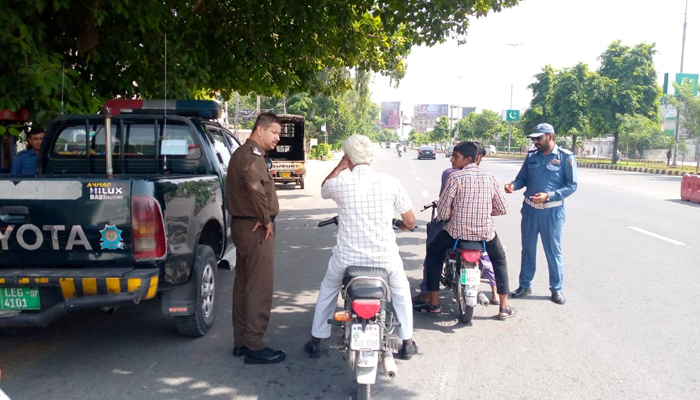Of reactive governance and neglected priorities
TRAFFIC POLICE in Punjab, particularly in Lahore, started cracking down on underage drivers, including students after a recent terrible accident in the provincial metropolis where six people died.
This is a perfect example of how the government seems to only react to problems instead of preventing them. The question is: why didn't they take action or preventive measures earlier, before such a tragic event occurred?
Their response seems reactive, addressing issues only after they've caused significant harm, rather than being proactive to prevent these situations from happening in the first place. It seems troubling that the police are resorting to extreme measures like putting underage drivers, including students, behind bars and showcasing their arrests on social media.
By treating these young individuals as criminals, putting them in lock-up, and sharing these incidents online, it raises serious concerns about violating the rights of children.
This approach risks pushing them further into a world of crime rather than guiding them away from it.
Public exposure and labeling as criminals can potentially harm their future prospects and lead them towards a path of further involvement in illegal activities.
There is a growing concern among the masses that instead of helping these young individuals understand the consequences of their actions and guiding them towards a better path, such methods might inadvertently push them deeper into a cycle of criminal behavior. A proactive approach from the government would involve taking measures beforehand to prevent such incidents. For instance, they could have implemented better monitoring systems to detect underage drivers, conducted awareness campaigns about the dangers of underage driving, and enforced stricter regulations. They might have also focused on educating young individuals about road safety and ensured proper enforcement of existing laws to discourage underage driving. Essentially, it's about taking steps in advance to avoid such tragedies rather than waiting for something unfortunate to happen before acting.
And when it comes to school students using motorbikes, there are two key issues at play. Firstly, the government's failure to provide transportation for school students over the years has put immense pressure on parents. They're forced to take on the responsibility of ferrying their children to and from school, leading to both time constraints and financial burdens. This absence of transport facilities from the government has created a significant inconvenience for families.
Secondly, in response to this challenge, some parents opt to provide motorbikes to their underage children for commuting to school, attempting to ease the burden on themselves. However, this action raises concerns because it involves underage individuals riding vehicles, which poses safety risks.
The dual concern lies in the government's failure to fulfill its responsibility of providing transport for students and in parents feeling compelled to take matters into their own hands, potentially compromising the safety and legality of their children's transportation to school. Both issues require attention: the need for improved government-provided transportation services for students and the importance of parents adhering to legal and safety regulations while addressing transportation challenges. The government’s excuse of lacking funds for providing buses to school children seems questionable when considering the abundance of official vehicles available to government officials. Many officials have multiple vehicles at their disposal for their own commuting purposes.
It raises a valid question: If the government can afford numerous official vehicles for its officers, why not allocate some of these resources to provide transportation services for school children? There seems to be a misalignment in priorities when it comes to allocating resources for transportation. It appears that resources are available but are directed more towards the convenience of officials rather than addressing the crucial need for safe and reliable transportation for school kids.
-
 Reese Witherspoon Sparks Nostalgia With 'Green Sisters' Tribute To Jennifer Aniston
Reese Witherspoon Sparks Nostalgia With 'Green Sisters' Tribute To Jennifer Aniston -
 Royal Family Faces Fresh Crisis While Andrew's Controversy Refuses To Die
Royal Family Faces Fresh Crisis While Andrew's Controversy Refuses To Die -
 Travis Kelce’s Mom Talks About Taylor Swift’s Wedding Dance Song And Whether She’s Signed An NDA
Travis Kelce’s Mom Talks About Taylor Swift’s Wedding Dance Song And Whether She’s Signed An NDA -
 James Van Der Beek's Final Days 'hard To Watch' For Loved Ones
James Van Der Beek's Final Days 'hard To Watch' For Loved Ones -
 Lewis Hamilton Ditched Question About Kim Kardashian?
Lewis Hamilton Ditched Question About Kim Kardashian? -
 Will Smith, Jada Pinkett's Marriage Crumbling Under Harassment Lawsuit: Deets
Will Smith, Jada Pinkett's Marriage Crumbling Under Harassment Lawsuit: Deets -
 'Fake' Sexual Assault Report Lands Kentucky Teen In Court
'Fake' Sexual Assault Report Lands Kentucky Teen In Court -
 'Vikings' Star Shares James Van Der Beek's Birthday Video After His Death
'Vikings' Star Shares James Van Der Beek's Birthday Video After His Death -
 Jennifer Aniston Receives Public Love Note From Jim Curtis On 57th Birthday
Jennifer Aniston Receives Public Love Note From Jim Curtis On 57th Birthday -
 Microsoft AI Chief Says AI Will Replace Most White-collar Jobs Within 18 Months
Microsoft AI Chief Says AI Will Replace Most White-collar Jobs Within 18 Months -
 Late Virginia Giuffre’s Brother Reacts To King Charles’ Promise Against Andrew Mountbatten-Windsor
Late Virginia Giuffre’s Brother Reacts To King Charles’ Promise Against Andrew Mountbatten-Windsor -
 Ex-Arsenal Footballer Thomas Partey Charged With Additional Rape Counts
Ex-Arsenal Footballer Thomas Partey Charged With Additional Rape Counts -
 AI Regulation Battle Heats Up: Anthropic Pledges $20m To Rival OpenAI
AI Regulation Battle Heats Up: Anthropic Pledges $20m To Rival OpenAI -
 Queen Camilla Makes Poignant Visit To Police Stations To Inspect Work
Queen Camilla Makes Poignant Visit To Police Stations To Inspect Work -
 Chloe Kim Set For Historic Halfpipe Gold Showdown At Milano Cortina
Chloe Kim Set For Historic Halfpipe Gold Showdown At Milano Cortina -
 Brooklyn Beckham Gives Cold Response To Cruz's Olive Branch Amid Feud
Brooklyn Beckham Gives Cold Response To Cruz's Olive Branch Amid Feud




